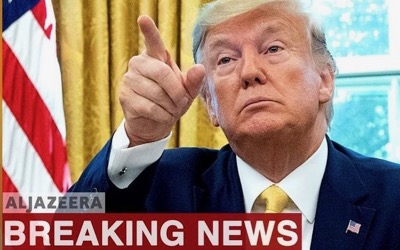
In the course of a telephone conversation, President Donald Trump and his Turkish counterpart, Recep Tayyip Erdoğan agreed that the Turkish army would not take Ain al-Arab, a Syrian border town known in the West under its German (and not Kurdish) name of Kobane [1] which has since become a symbol.
At the end of 2015, a battle between the YPG and Daesh was waged in front of television cameras located across the Syrian-Turkish border. Much of the city was in ruins and Daesh had withdrawn. This event was widely publicized to celebrate the courage of the YPG against the jihadists. However, the Kurds were not fighting to stamp out Islamist doctrine; land conquest is their goal.
Notwithstanding the congenial telephone call, President Trump announced sanctions against Turkey. [2].
– He froze the assets of the Energy, Defence and Interior Ministers (Fatih Dönmez, General Hulusi Akar and Süleyman Soylu, respectively).
– He raised tariffs on Turkish steel by 50%.
– Finally, he suspended trade negotiations between the two countries.
These sanctions are purely symbolic since the three targeted ministers do not have any personal interests in the United States. Turkish steel was already taxed at 50% last May. The Turkish economy is very dependent on Washington and it would be very simple for Donald Trump, if he so wanted, to instantly put Turkey on her knees.
It is as though President Trump had given his Turkish counterpart the green light to launch Operation "Source of Peace" to put an end to the Rojava project and that the only reason for his toothless sanctions against Turkey is to placate Democrats at home.
[1] Kobane is the contraction of the name of the Koban Railway Company which was commissioned by the Reich to build a railway for the Ottomans linking KOnya to BAgdad.
[2] “Donald Trump Regarding Turkey’s Actions in Northeast Syria”, by Donald Trump, Voltaire Network, 14 October 2019.











Stay In Touch
Follow us on social networks
Subscribe to weekly newsletter